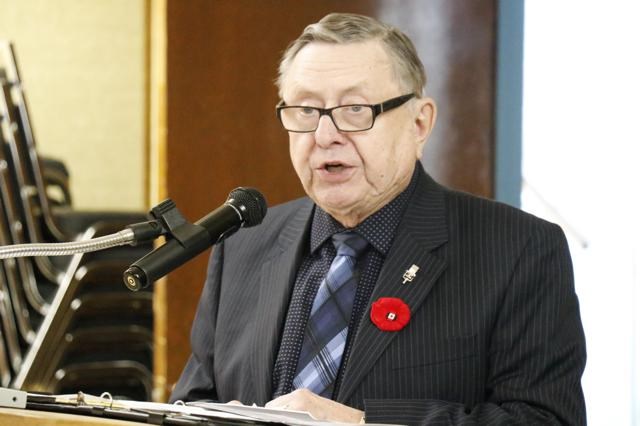By Greg Nikkel
Lorne Harasen had a broadcasting career that spanned nearly six decades in TV and radio, and he shared stories from many of the personalities he met and interviewed over the years in a presentation to the Weyburn Rotary Club on Thursday.
He shared stories about encounters with personalities ranging from Prince Phillip and W.O. Mitchell to John Diefenbaker, Sid Caesar and Don Cherry, many of which were set out in his book, “The Harasen Line”, which he released a year ago.
He began his career in Yorkton, and worked in TV and radio in both Saskatoon and Regina, including at CFQC, CKRM and CKCK radio and TV, and emceed the first televised debate for the 1986 provincial election.
Harasen began with some comments about U.S. president Donald Trump.
“I’ve covered all kinds of events, and national policy leadership conventions and interviews, and I’ve never seen anything quite like him. I don’t know where he’s headed. He’s finished one year of a four-year term, but hopefully he won’t step out of line too much,” he said.
One of his most interesting interviews, he said, was with the last hangman in Canada - a man who did not want any information about his family or address known because he didn’t want the families of those who have been hanged to be contacting him.
“He thought he was performing a public service, and was concerned that his job was coming to an end,” said Harasen.
Relating how he met Prince Phillip, Harasen noted he was involved in the committee for the Saskatchewan War Memorial, and during a visit to Regina he accompanied the prince when they walked to see where the memorial was to be located. He asked Phillip about a story of an encounter with an American, and was assured it was completely true.
His Royal Highness had apparently been asked by an American tourist why Windsor Castle was built so close to the airport, and he replied it was done deliberately, while the tourist was apparently oblivious to the fact the castle had been built hundreds of years before the airport was ever built.
Harasen had met author and Weyburn native W.O. Mitchell a number of times, and related one particular experience where Mitchell was in the studio and didn’t realize the microphone was on.
“I said something to him and the microphones were on, and he said to me, ‘oh you son of a bitch,” said Harasen, adding that during a commercial break he told him what had gone over the air, and Mitchell said, “You’re my favourite son of a bitch.”
Later on, at a book release, he had Mitchell sign a copy of his novel for Harasen with that phrase, and said he treasures it as he considered Mitchell as “Canada’s Mark Twain, or maybe Twain was America’s W.O. Mitchell.”
His experience in meeting Don Cherry was a positive one, as Harasen compared it with covering a sportsmen’s dinner with NFL great Franco Harris of the Pittsburgh Steelers. Harasen noted Harris spoke for 10 minutes with a rambling speech that made no sense, at the end of which he made his way out of the Saskatchewan Hotel and was never seen again.
When Cherry came for a similar event, he not only gave a good speech, but hung around afterwards to talk with anyone and everyone who wanted to meet him.
One surprise for him was in meeting Ken Curtis, who was known as the character Festus on “Gunsmoke” with Matt Dillon.
“Would you believe he once replaced Frank Sinatra as a vocalist with the Tommy Dorsey Orchestra? He sounded great. He was a great vocalist,” said Harasen.
Former prime minister John Diefenbaker was not an easy person to deal with sometimes, said Harasen, recalling one time he had arranged for him to do a television interview, and sent a taxi to his hotel to get him but he didn’t meet the driver. He arranged to meet him on a Saturday morning to do the interview, which Dief agreed to, and Harasen drove over to get him personally, bringing his son Greg with him.
His son was 13 or 14 at the time, and Harasen was surprised that when he picked up Diefenbaker and drove him to the studio, Dief and his son struck up a conversation and ended up becoming friends.
“All I did was drive. We did some promo shots outside, and I drove him back,” said Harasen, while Dief and his son continued talking, and as he dropped him off, the then-PM told his son, “Whenever I’m in town, you come and see me, and if there’s a lineup to see me, come up to the front.”
“My wife and I were pleased that Dief took an interest in my son. It was a good experience for him,” said Harasen, noting his son went on to be a veterinarian, and recently retired and sold his practice.
Tommy Douglas was always good to talk to, said Harasen. “He remembered your name and your cameraman’s name. He was pleasant to be interviewed, and I don’t recall he was ever hesitant.”
Asked what his most difficult interview was from his career, Harasen thought for a while about that, and related an encounter with the actor Sid Caesar, who was in Regina to do a theatre production at Stage West. He was supposed to come to the studio for an interview, but he was difficult to relate to, as at first he refused to come into the building, but was finally convinced to come up the stairs. Once inside, said Harasen, he acted like he was high on something and was largely incoherent.
“I was told afterward he was hospitalized for a little while,” said Harasen, and then saw him on an interview on TV. “He was a genius in his prime. I was happy to see him on TV some months after and he looked fine.”



